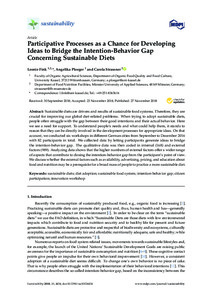Aufsatz

Participative Processes as a Chance for Developing Ideas to Bridge the Intention-Behavior Gap Concerning Sustainable Diets
Zusammenfassung
Sustainable diets are drivers and results of sustainable food systems. Therefore, they are crucial for improving our global diet-related problems. When trying to adopt sustainable diets, people often struggle with the gap between their good intentions and their actual behavior. Here we see a need for support. To understand people’s needs and what could help them, it stands to reason that they can be directly involved in the development processes for appropriate ideas. On that account, we conducted six workshops in different German cities from September to December 2016 with 82 participants in total. We collected data by letting participants generate ideas to bridge the intention-behavior gap. The qualitative data was then coded in internal (168) and external factors (989). Analyzing data shows that the higher numbers of external factors offer a wider range of aspects that contribute to closing the intention-behavior gap from the participant’s point of view. We discuss whether the external factors such as availability, advertising, pricing, and education about food and nutrition may be a prerequisite for a broad mass of people to practice a more sustainable diet.
Zitierform
In: Sustainability 2018, 10 / 12 (2018-11-27) , S. 4434 ; EISSN: 2071-1050Förderhinweis
Gefördert durch den Publikationsfonds der Universität KasselZitieren
@article{doi:10.17170/kobra-20190204146,
author={Fink, Leonie and Ploeger, Angelika and Strassner, Carola},
title={Participative Processes as a Chance for Developing Ideas to Bridge the Intention-Behavior Gap Concerning Sustainable Diets},
journal={Sustainability},
year={2018}
}
0500 Oax 0501 Text $btxt$2rdacontent 0502 Computermedien $bc$2rdacarrier 1100 2018$n2018 1500 1/eng 2050 ##0##http://hdl.handle.net/123456789/11065 3000 Fink, Leonie 3010 Ploeger, Angelika 3010 Strassner, Carola 4000 Participative Processes as a Chance for Developing Ideas to Bridge the Intention-Behavior Gap Concerning Sustainable Diets / Fink, Leonie 4030 4060 Online-Ressource 4085 ##0##=u http://nbn-resolving.de/http://hdl.handle.net/123456789/11065=x R 4204 \$dAufsatz 4170 7136 ##0##http://hdl.handle.net/123456789/11065
<resource xsi:schemaLocation="http://datacite.org/schema/kernel-2.2 http://schema.datacite.org/meta/kernel-2.2/metadata.xsd"> 2019-02-05T13:10:08Z 2019-02-05T13:10:08Z 2018-11-27 doi:10.17170/kobra-20190204146 http://hdl.handle.net/123456789/11065 Gefördert durch den Publikationsfonds der Universität Kassel eng Urheberrechtlich geschützt https://rightsstatements.org/page/InC/1.0/ sustainable diets diet adoption sustainable food system intention-behavior gap citizen participation innovation workshop 630 Participative Processes as a Chance for Developing Ideas to Bridge the Intention-Behavior Gap Concerning Sustainable Diets Aufsatz Sustainable diets are drivers and results of sustainable food systems. Therefore, they are crucial for improving our global diet-related problems. When trying to adopt sustainable diets, people often struggle with the gap between their good intentions and their actual behavior. Here we see a need for support. To understand people’s needs and what could help them, it stands to reason that they can be directly involved in the development processes for appropriate ideas. On that account, we conducted six workshops in different German cities from September to December 2016 with 82 participants in total. We collected data by letting participants generate ideas to bridge the intention-behavior gap. The qualitative data was then coded in internal (168) and external factors (989). Analyzing data shows that the higher numbers of external factors offer a wider range of aspects that contribute to closing the intention-behavior gap from the participant’s point of view. We discuss whether the external factors such as availability, advertising, pricing, and education about food and nutrition may be a prerequisite for a broad mass of people to practice a more sustainable diet. open access Fink, Leonie Ploeger, Angelika Strassner, Carola doi:10.3390/su10124434 publishedVersion EISSN: 2071-1050 12 Sustainability 4434 2018, 10 </resource>
Die folgenden Lizenzbestimmungen sind mit dieser Ressource verbunden:
Urheberrechtlich geschützt

